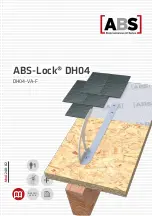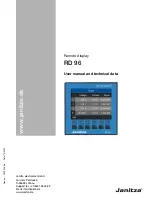
NOTE:
Sensors assigned to brooding equipment can’t be assigned to other equipment or to average
house/barn temperature calculations.
Alarm Setup
You can set alarms on most parameters in order to be alerted when these parameters go too far out of
range. Alarm limits are configured in the house/barn setup.
Alarm types
Critical
temperature
The highest or lowest critical temperature has been reached
House/barn aver-
age temperature
The average house/barn temperature is out of range
Temperature
probe
The temperature is out of range
Static pressure
The static pressure reading is out of range
Relative humidity
The relative humidity reading is out of range
Water usage
Water usage is out of range
Water spill alarm
A water spill has occurred
Feeder run time
The feeder run time is out of range
Auger run time
The auger run time is out of range
Alarm relay assignation
One or many relays can be configured in each house/barn. Any alarm relay that is configured is available
for selection in all house/barns or rooms on site, meaning alarm relays are not limited for selection to the
house/barn they are configured in.
Alarm relays can be connected to a local alarm device, such as a siren, a buzzer or light, or to an alarm
system that transmits the message through the phone (such as an Agri-Alert) or to an alarm station. The
alarm relay can also be used to inhibit the source of the alarm (such as shutting off the water on a water
spill alarm ) or stopping the auger on a maximum run time alarm.
Temperature alarms
House/barn temperature alarms include critical, high and low temperature conditions in production, pre-
heat and clean modes.
Alarm offsets and thresholds can be different in each house/barn mode. Since there is no mode related to
production in service rooms, the user interface is slightly different in those rooms. The pre-heat and clean
mode sections are only displayed when a production house/barn uses these modes.
House/barn temperature alarms monitor house/barn average temperature, house/barn average tempera-
ture assigned probe sets can vary with ventilation modes so there must be at least one configured tem-
perature probe and at least one probe assigned to average house/barn temperature (in probe assignment
screen) for house/barn temperature type to be shown. When alarm conditions are met for a long time the
alarm can be triggered and recovered at different temperatures.
86
895-00693
EDGE
Summary of Contents for EDGE 890-00601
Page 16: ...Chapter 1 Introduction 16 895 00693 EDGE...
Page 22: ...NOTES 22 895 00693 EDGE...
Page 26: ...Chapter 2 Basic connections Figure 2 1 EDGE 3 Slot Expansion Box 26 895 00693 EDGE...
Page 44: ...NOTES 44 895 00693 EDGE...
Page 52: ...NOTES 52 895 00693 EDGE...
Page 60: ...NOTES 60 895 00693 EDGE...
Page 76: ...NOTES 76 895 00693 EDGE...
Page 108: ...NOTES 108 895 00693 EDGE...
Page 110: ...Chapter 11 Test mode 110 895 00693 EDGE...
Page 128: ...NOTES 128 895 00693 EDGE...
Page 132: ...NOTES 132 895 00693 EDGE...
Page 138: ...NOTES 138 895 00693 EDGE...
Page 140: ...NOTES 140 895 00693 EDGE...
Page 142: ...NOTES 142 895 00693 EDGE...
Page 146: ...NOTES 146 895 00693 EDGE...
Page 150: ...NOTES 150 895 00693 EDGE...
Page 154: ...NOTES 154 895 00693 EDGE...
Page 156: ...NOTES 156 895 00693 EDGE...
Page 158: ...NOTES 158 895 00693 EDGE...
Page 176: ...Chapter 26 Test mode 176 895 00693 EDGE...
Page 188: ...NOTES 188 895 00693 EDGE...
Page 192: ...NOTES 192 895 00693 EDGE...
Page 194: ...NOTES 194 895 00693 EDGE...
Page 202: ...NOTES 202 895 00693 EDGE...
Page 204: ...NOTES 204 895 00693 EDGE...
Page 206: ...NOTES 206 895 00693 EDGE...
Page 214: ...NOTES 214 895 00693 EDGE...
Page 216: ...NOTES 216 895 00693 EDGE...
Page 218: ...NOTES 218 895 00693 EDGE...
Page 220: ...NOTES 220 895 00693 EDGE...
Page 224: ...NOTES 224 895 00693 EDGE...
Page 226: ...NOTES 226 895 00693 EDGE...
Page 230: ...NOTES 230 895 00693 EDGE...
















































